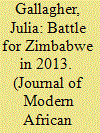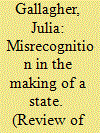| Srl | Item |
| 1 |
ID:
146111


|
|
|
|
|
| Summary/Abstract |
On the face of it, the triumph of Robert Mugabe and ZANU(PF) in the 2013 elections came as a shock, not least to opposition MDC activists. However, after a period of introspection, many have begun to construct a coherent and wide-ranging account of the result which explores opposition shortcomings, and the revived relationship between the electorate and Mugabe's ZANU(PF). This article, based on interviews with political activists conducted three months after the election, outlines and attempts to explain this account. It explores the way in which a politics of polarisation that dominated Zimbabwe in recent years appears to have given way to a politics of ambivalence: where Zimbabweans once viewed their political landscape as one populated by antinomies, they now see their state and its relation to themselves in more complex and ambiguous ways. As a result, Zimbabweans' conception of the state is increasingly coming to resemble Mbembe's formulation of states as contemporaneously ‘organizers of public happiness’ and wielders of arbitrary violence.
|
|
|
|
|
|
|
|
|
|
|
|
|
|
|
|
| 2 |
ID:
098509


|
|
|
| 3 |
ID:
149111


|
|
|
|
|
| Summary/Abstract |
This article uses psychoanalytic object relations theory to construct a way to understand why interviews in IR research—viewed here as encounters between strangers—can be felt as “catastrophic.” The theory supports critical theoretical approaches that suggest that the world is structured through self–other relations and argues that encounters with “others” are unsettling because they can undermine the ways we constitute ourselves in relation to the wider world. Yet such challenges are inevitable if research is to challenge existing object constructions and the power relations that attend them. The article illustrates this argument with a detailed discussion of research interviews conducted in Zimbabwe.
|
|
|
|
|
|
|
|
|
|
|
|
|
|
|
|
| 4 |
ID:
162493


|
|
|
|
|
| Summary/Abstract |
This article draws on a Kleinian psychoanalytic reading of Hegel’s theory of the struggle for recognition to explore the role of international misrecognition in the creation of state subjectivity. It focuses on Ghana’s early years, when international relations were powerfully conceptualised and used by Kwame Nkrumah in his bid to bring coherence to a fragile infant state. Nkrumah attempted to create separation and independence from the West on the one hand, and intimacy with a unified Africa on the other. By creating juxtapositions between Ghana and these idealised international others, he was able to create a fantasy of a coherent state, built on a fundamental misrecognition of the wider world. As the fantasy bumped up against the realities of Ghana’s failing economy, fractured social structures, and complex international relationships, it foundered, causing alienation and despair. I argue that the failure of this early fantasy was the start of Ghana’s quest to begin processes of individuation and subjectivity, and that its undoing was an inevitable part of the early stages of misrecognition, laying the way for more grounded struggles for recognition and the development of a more complex state-subjectivity.
|
|
|
|
|
|
|
|
|
|
|
|
|
|
|
|
| 5 |
ID:
108500


|
|
|
|
|
| Publication |
2011.
|
| Summary/Abstract |
British reactions to China's increasing engagement with Africa in recent years have been manifested in particularly negative and reductive ways tending to depict China's presence in Africa as destructive and self-serving, in contrast to Britain's more enlightened, supportive approach. However, more recently official discourse has begun to stress the shared outlook between British and Chinese objectives, emphasising Chinese moves towards a more constructive, development-focused approach in Africa. This article discusses the ways in which China in Africa is viewed in British political circles and assesses the degree to which such views resonate with the British sense of its own idealised identity. It suggests that the two narratives represent two sides of a dual 'liberal' approach to the problem of 'non-liberal' actors in international politics: first the tendency to reject and see them as outside the international order; and second the attempt to rehabilitate them and bring them within it. The article concludes by exploring a number of reasons for the particular ways in which Britain, China and Africa are configured, arguing that this dual conception represents a sense of ambiguity about the potential universality of liberalism.
|
|
|
|
|
|
|
|
|
|
|
|
|
|
|
|
| 6 |
ID:
181242


|
|
|
|
|
| Summary/Abstract |
There are striking differences between state buildings in Ghana and Côte d’Ivoire and in how citizens living in each country’s capital city think and talk about them. In this article, we explore the degree to which these buildings illustrate very different ideas of statehood in West Africa. We draw on art theories from West Africa to argue that architectural aesthetics rest on juxtapositions of beauty and the sublime and we suggest ways these help establish state meaning. We then apply our aesthetic approach to citizens’ evaluations of their state buildings in Ghana and Côte d’Ivoire and illustrate how differently the approach plays out, in Ghana where the state emerges as acclimatized and relatively robust and in Côte d’Ivoire where the state emerges as idealized and fragile.
|
|
|
|
|
|
|
|
|
|
|
|
|
|
|
|